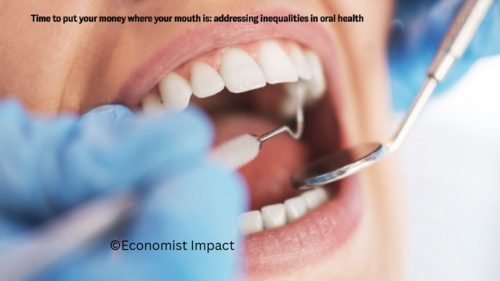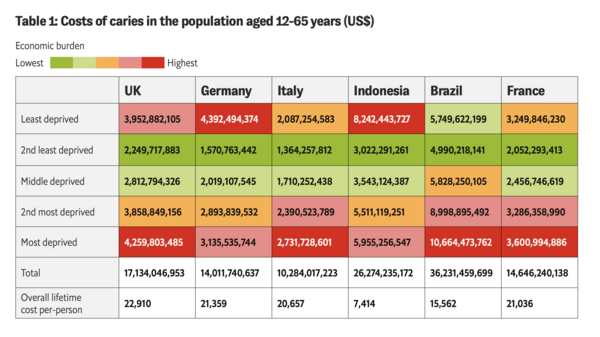![]()
26 April 2024
Periodontitis and caries: a close look at Italy's challenges and solutions
Categories:Communication, Institutional, Publications

Italy, like other nations, faces significant challenges in oral health, particularly in managing caries and periodontitis. The recent Economist Impact white paper Time to put your money where your mouth is, commissioned by the EFP and supported by Haleon, brings to light the many issues surrounding oral health in Italy (and beyond), and proposes strategic interventions to mitigate these challenges.
Oral diseases, recognised as non-communicable diseases (NCDs), pose a significant health burden due to their high prevalence and impact on individuals' well-being. According to the report, the total cost of caries in the Italian population aged 12-65 years is over 10.284 billion US$. The overall lifetime cost of caries per-person is 20,657 US$. In the most deprived quintile of the Italian population, the cost is 27,435 US$.
The white paper emphasises the need for an integrated approach to managing periodontitis and caries, highlighting the interconnectedness of oral health and overall health. Despite the clear links, oral health often remains side-lined in the broader NCD conversation.
Italy's struggle with oral health disparities is exacerbated by socioeconomic and cultural determinants. The second National Pathfinder Study in Italy revealed a strong correlation between the prevalence and severity of caries and socioeconomic indicators such as lower education levels, unemployment rates, and smoking habits. These determinants not only influence the risk and management of oral diseases but also access to dental care.
Access to dental care remains a challenge, particularly for lower-income and rural populations. Despite some public dental services for children and vulnerable communities, a significant portion of the Italian population faces financial barriers to regular dental care. It is estimated that 60% of people in Italy do not attend regular dental appointments because they must pay out-of-pocket. Preventive measures, both at the population and individual levels, are also hampered by barriers including cost, lack of awareness, and resistance from commercial interests, particularly regarding the proposed sugar tax that has been delayed a number of times since it was first presented in 2020.
The president of the Italian Society of Periodontology and Implantology (SIDP) Professor Francesco Cairo commented: "We are at a critical juncture where implementing a sugar tax and ensuring the reimbursement of oral health services are not just policy choices but moral imperatives. These steps are essential to bridge the gap in oral health equity and ensure that all Italians, regardless of their socioeconomic status, have access to the care they need. By investing in preventive care and making strategic fiscal policies, we can safeguard the well-being of our nation."
The white paper analysis, including the "caries prevention and care cost calculator," highlights the substantial direct costs associated with caries management across different socioeconomic groups. The findings stress the economic and health benefits of preventive interventions and the significant cost of inaction, not only in terms of direct healthcare costs but also considering the broader impact on individuals' quality of life and well-being.
To address these challenges, the white paper proposes a multi-faceted approach, focusing on both upstream and downstream interventions. Key recommendations include:
- Implementing a sugar tax: recognising the strong opposition from corporate players, the white paper argues for the implementation of a sugar tax as a measure to reduce sugar intake and, consequently, the risk of caries and other NCDs. This aligns with global trends aiming to combat the commercial determinants of health.
- Enhancing preventive care: there is a pressing need for improved preventive care, emphasising the importance of early education on oral health, access to affordable oral hygiene products, and interventions such as fluoridation and sealants.
- Bridging the access gap: policies must aim to improve access to dental care for all socioeconomic groups, focusing on reducing the barriers that disproportionately affect the most deprived populations.
"The evidence is clear: investing in oral health is investing in overall health. The link between oral diseases and systemic health issues underscores the need for integrated healthcare approaches that encompass oral health as a priority,” explains Nicola West, EFP secretary general. “By championing policies that promote oral health, we not only prevent dental diseases, we also contribute to fight against other non-communicable diseases, thereby enhancing the well-being and productivity of our societies."





